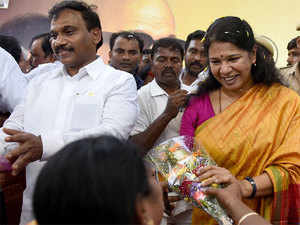By

Views expressed here are the authors' own, and not Economictimes.com's ..
Swaminathan S Anklesaria Aiyar

India has many crimes but no criminals. That one-liner is only a slight exaggeration of the outcome so far in the 2G case, and other cases against politicians.
In 2012, the Supreme Court held in a public interest suit that the issue of 122 telecom 2G licences in 2008 was "arbitrary and unconstitutional"; that telecom minister Raja "virtually gifted away natural resources"; and that Raja's First Come First Served procedure was grossly distorted to favour a few. The Supreme Court cancelled all 122 licences and levied stiff fines totaling Rs 17 crore on seven licencees.
But now the lower CBI court headed by Justice Saini has held there was no crime at all, and acquitted all 17 accused. The evidence before the two courts was much the same, yet the verdicts are poles apart. What sort of justice system do we have?
Justice Saini has flayed the shoddiness of the CBI investigation, the public prosecutor and (implicitly) the Supreme Court judgment. His own verdict has been flayed as shoddy by legal experts like Prashant Bhushan. So much for the quality of our police-judicial system, which rarely catches and convicts influential persons beyond all appeals. When law-breaking carries so little risk, no wonder corruption is rife.
The Congress and DMK are celebrating Saini's verdict as proof of their innocence, claiming they have been victims of a smear campaign by the BJP and media. Sorry, but this case is going to be appealed in the High Court and later the Supreme Court. Will the Supreme Court ultimately agree with Justice Saini that there was no crime, or reiterate its original finding that a massive crime occurred? I rate the chances of the Supreme Court ultimately convicting Raja and others as over 80%.
Many political analysts say the Saini verdict opens the way for a BJP-DMK alliance in Tamil Nadu. Modi should publicly rule that out immediately. It will seriously tarnish his Mr Clean image. Voters know how shoddy and incompetent the police-judicial system is, and will certainly not conclude, on the basis of a single verdict, that the Congress is an uncorrupt victim rather than a corrupt perpetrator. Modi should back the original Supreme Court verdict, and fight to the finish.
Did the Comptroller and Auditor General (CAG) exaggerate grossly in claiming that the exchequer lost Rs 176 lakh crore by not auctioning 2G spectrum? Yes indeed. The CAG used as a benchmark the bids for artificially scarce 3G spectrum. The actual prices obtained when 2G spectrum was auctioned were far lower. Besides, as former RBI governor Subbarao testified, every government has to make a trade-off between welfare maximization and revenue maximization. He said the relatively low spectrum rate fixed by Raja was a "revenue sacrifice" to keep telecom prices low, not a "revenue loss."
Yet the key issue is not how much revenue was lost, but whether the procedure was fair and uncorrupt. The Supreme Court earlier said no. Justice Saini now says yes. The Supreme Court will, however, have the last word.
Many courts the world over have taken the stand that to prove corruption, a quid pro quo must be established between money paid and a favour granted. Such evidence is hard to find. In this case, investigative agencies traced a flow of money from Swan Telecom to Kalaignar TV (owned by DMK leader Kanimozhi) through several intermediaries, and said this represented a bribe. But Justice Saini said there was no crime, and hence no flow of money could be criminal. I greatly doubt that this will be upheld by higher courts on appeal.
Forget this case. Why does India have such a lousy police-judicial system that takes forever and convicts so few? Because there is no push at all for reform. All political parties seem to prefer a weak system (which convicts very few) over a strong system that would convict members of every party. Sadly, every party has skeletons in its cupboard.
Remember the Jain hawala case, where the Jain diaries showed pay-offs to politicians of all parties? The government tried to mothball the case, with no objections from the Opposition. But following a public interest suit, an enraged Supreme Court ordered a CBI investigation. Alas, all the accused were exonerated. The amicus curiae in that case, Anil Divan, said that a deliberately weak prosecution had thwarted convictions. Conspiracy theorists speculate that something similar may have happened in the 2G case.
Our police-justice system needs a complete overhaul. Right now it yields neither speed nor justice, just shoddiness. That is a scam much bigger than the 2G scam.
Views expressed here are the authors' own, and not Economictimes.com's ..
No comments:
Post a Comment